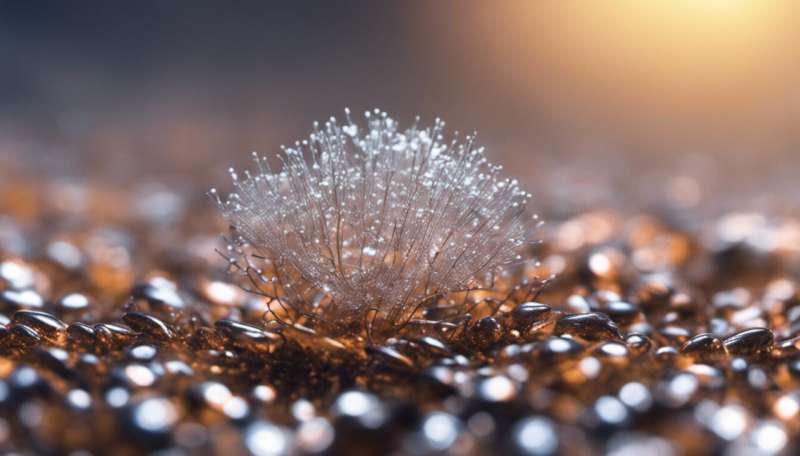Nature-inspired antibacterial metals

From aviation to medicine, various sectors are increasingly using materials that mimic the lotus plant, whose leaves have self-cleaning properties. Thanks to the bumpy surface structure covered with tube-shaped wax crystals, water falling on these leaves forms beads that roll off, carrying away dust and dirt. Using this naturally occurring lotus effect concept, a team of scientists has taken a quantum leap towards the production of self-cleaning sheet metal on an industrial scale. Supported by the EU-funded TresClean project, the team created a roughened surface on the metal that reduces wettability and prevents bacterial adhesion.
A news item by the Science|Business Network of industry research and policy organisations summarises the technology: "TresClean has used high-power laser cutting devices to create microscopic 'spikes' and 'ridges' in sheet metal causing liquids to 'bounce off' the rough micro-topography that mimics the surface of the Lotus leaf."
Avoiding bacterial contamination
The same item notes that this particular structure "creates miniature pockets of air that minimises the contact area between the surface and a liquid, almost like standing on a bed of needles." TresClean project coordinator Prof. Luca Romoli explains: "In the same way that Lotus leaves keep themselves clean, without the need for cleaning products or chemicals, their jagged, rough surfaces enable water to stay as spherical droplets by preventing 'spreading'."
He adds: "Bacteria do not get a chance to stick because the contact with the metal surface and the liquid is reduced by over 80 percent. We are looking at an anti-bacterial metal." The techniques involved in TresClean "will be applied to produce self-cleaning and aseptic machine parts for food industry (e.g. components in contact with biological foods) and home appliances (e.g. dishwashers)," as stated on the project website.
Reduced cleaning phases
In the news item, Prof. Romoli describes the project's impact: "Vats in milk factories need to be cleaned every 6-8 hours to avoid the exponential growth of bacteria. This hinders usage and therefore affects output." He goes on to say: "By saving hours per day in cleaning, it will yield an efficiency improvement stemming from fewer sterilization cycles and less cleaning time within production as a whole. This will also reduce energy consumption as a result of fewer cleaning phases making food production quicker, safer and more profitable." TresClean could also be beneficial for medical cutting tools and sterile surfaces, among other applications, according to Prof. Romoli.
The ongoing TresClean (High ThRoughput lasEr texturing of Self-CLEANing and antibacterial surfaces) project was set up "to transform laser surface texturing from a low productivity process limited by a lack of power and restricted beam manipulation to a high-throughput process harnessing ultrashort pulsed high-power lasers and high-speed scanners" as stated on CORDIS. The project partners hope the upscaling of laser technology will be completed by mid-2019.
More information: TresClean project website:
Provided by CORDIS




















